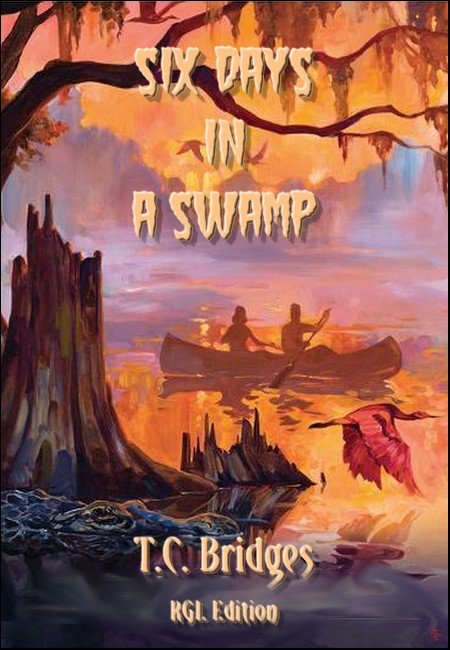
RGL e-Book Cover©
Based on an old Florida travel poster
Roy Glashan's Library
Non sibi sed omnibus
Go to Home Page
This work is out of copyright in countries with a copyright
period of 70 years or less, after the year of the author's death.
If it is under copyright in your country of residence,
do not download or redistribute this file.
Original content added by RGL (e.g., introductions, notes,
RGL covers) is proprietary and protected by copyright.

RGL e-Book Cover©
Based on an old Florida travel poster

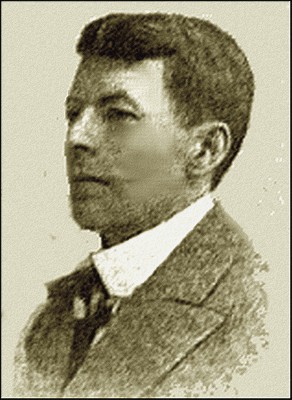
The author Mr. T.C. Bridges
The author and three friends arranged a pleasure trip down a Florida river from source to mouth—a journey that had never been accomplished before. The upshot of the expedition was that they got hopelessly lost in a vast swamp, and underwent many tribulations ere they finally reached civilisation.
Bridges re-told this story 20 years later in the his autobiohraphy Florida to Fleet Street. R.G.
IT was simply because no one had ever before rowed down the river from source to mouth that we were so keen to make the attempt. It may sound odd to most people's ears to talk of rowing from the source of a river; but Florida rivers are very different from others. As a rule, they rise full-fledged from the limestone rock—great, boiling, gushing fountains of transparent water of such volume that in some cases it is actually possible to run a stern-wheel steamboat to the very pool in which they appear.
The Wekiva River rises in this way, but Altamonte Spring, which is its source, is a comparatively small one, and when we lifted our eighteen-foot cat-boat from the wagon we had serious doubts as to whether she would fit into the little pool at all.
But there was no choosing our launching spot. The spring was the only place where we could reach the water, for beyond it the river plunged at once into thick "hammock" (hardwood forest) and was lost to view. It was Hobson's choice, and after much manoevring the boat slid down the steep bank and floated like a cork in the centre of the bubbling pool.
We piled our goods aboard and jumped after them. A shouted good bye to our negro teamster and we were off.
There were four of us who started on that lovely March morning. Three—Franks, Myers, and Marshall—were Americans; the fourth, your humble servant, an English orange-grower. Our idea was to make a very pleasant little picnic of the expedition. Twelve miles below Altamonte Spring another river, the Clay Springs Run, joined the Wekiva. Five miles up the Run was a settlement where we had friends. We meant to make this place the first night, sleep there, and start refreshed next morning for the mouth of the Wekiva, where it joins the St. John's. The latter part of the journey was reckoned we could do in two days, making three in all. How sadly mistaken we were in our calculations we were to discover to our cost.
The first part of our journey was distinctly exciting. The stream, far too narrow for rowing, ran deep and swift in a series of the very sharpest curves—so sharp that, in spite of the best efforts of the man in the bow, the boat constantly charged the high bank in a bull-headed fashion, which half filled her with loam and leaves and made her occupants sit down with emphatic bumps and still more emphatic language.
Suddenly there loomed up a dead trunk, lying right across the river from bank to bank. There was nothing for it but to cut through the obstacle. Myers sprang out with an axe, and the chips flew in a white shower.
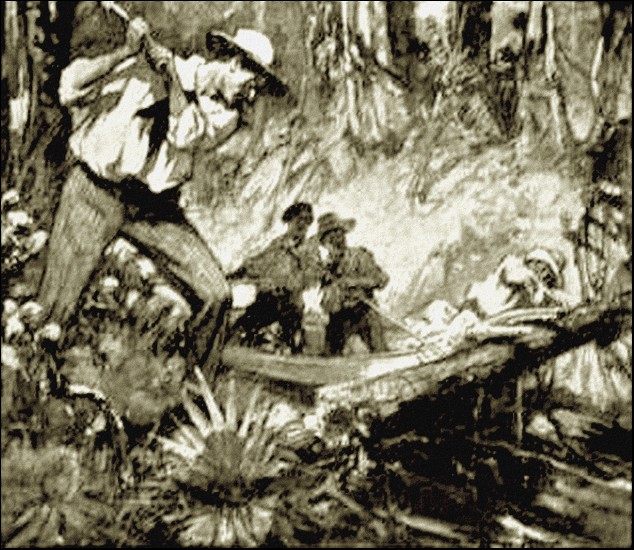
The chips flew in a white shower.
So did the ants. The half-rotten wood was the home of hordes of large red ants, which bit like fiends. Before the boat could be pulled clear she was swarming with the fierce little warriors, and long after the trunk had parted and the boat had passed on its way we were busy picking ants off ourselves and sweeping them overboard.
For some hours this sort of thing went on, the river gradually growing in size, but still too narrow and crooked for rowing. Sometimes a log had to be cut through; sometimes it was necessary to lift the boat over a half submerged trunk. The banks were high and heavily wooded and the sunlight glittered down through a tracery of delicate foliage. The trees were all hardwood—live oak, water oak, bastard oak, bay, red gum, and magnolia, the latter forest giants sixty feet high and filling the air with scent from white blooms the size of dinner-plates.
Soon after luncheon—a scratch repast of biscuits, cheese, and peach cider—the boat suddenly left the hammock and glided into the mazes of a great saw-grass swamp.
Saw-grass is a purely Floridan product. Ten to twelve feet from root to summit, its blades are grey green in colour, wide and stiff, with serrated edges which cut abominably. Nothing short of an alligator can penetrate it; its great height and thickness make it impossible to force a boat through it. It covers hundreds of square miles in South Florida, and many a life has been lost in its tangled recesses.
In the saw-grass the river spread out into a maze of shallow channels, and here our troubles began. We tried one after another, and over and over again grounded or ran into blind alleys and were forced to return.
Once we drove the boat hard aground. The bottom was fair yellow sand. Myers and Marshall pulled off their boots and sprang overboard to lift her. Instantly they were both up to their knees and sinking fast. We in the boat had to pull like grim death to haul them out of the patch of treacherous quicksand which they had happened on. Fortunately, by the use of our mast we managed to pole the boat back into water that would float it.
The sun was low before the dark green heads of cypresses loomed above the tall vegetation. In another ten minutes we had left the grass behind us, and with two men at the oars were pulling down a deep, placid creek between rows of giant cypress trees.
The place had a curious resemblance to the aisle of a great cathedral. The floor, placid brown water; the columns, giant grey trunks rising many feet before showing a branch; overhead great limbs with heavy intermingled foliage formed a magnificently arched roof. To add to the illusion, long trails of grey Spanish moss hung motionless in the breathless air, giving the appearance of tattered banners depending from the vault above.
From the bases of the monstrous trunks huge knees and buttresses extended far out into the water, gnarled and twisted into a thousand fantastic shapes, and curiously resembling those peculiar rocks seen where a lava stream has met salt water.
Here we saw for the first time what was later to prove our worst enemy, that curious weed the water-lettuce. The top of the water lettuce bears an exact resemblance to its garden namesake, but below is a huge mass of roots. It floats on the water, and, gliding gently down the sluggish current until it meets some obstruction, gathers in huge rafts, which finally block the whole stream from bank to bank. These rafts rot, and upon them grow forests of other weeds, until at last the river is entirely hidden.
It was growing late. There was now no longer any hope of reaching the Clay Springs Settlement that night. We realised that we should have to camp. But where? That was the question, for there was no longer any solid land to camp on. On either side lay miles of impenetrable swamp, deep black liquid mud, tangled creepers, and rotting vegetation; the only inhabitants alligators, snakes, and turtles.
Everyone was longing for a cup of hot coffee, so we landed on a great cypress buttress and lit a fire. Alas for our hopes of hot supper! The water was just beginning to boil when the buttress, which was hollow, burnt through, and fire and kettle together fell hissing into the black water below. Worse still, the cyprus trunk itself look fire, and we had to sheer off rapidly and tie up at some distance away.
We had no means of cooking in the boat, and made a miserable meal on biscuit and cheese. Meantime the fire had got a good hold on the cypress, and we were treated to a magnificent spectacle. The trunk of the ancient giant was hollow, like the buttress, and under the furious draught the flames rushed up it with a loud roar, spouting in crimson pennons from every knot hole and throwing a red glare upon the still, dark water and sleeping forest. Bats and weird night birds swooped above, and every now and then a great branch came crashing down into the river. We watched for an hour or more, and then all of a sudden the blazing shell collapsed and fell with a hissing roar into the depths below, throwing up a wave that washed clean over our stern.
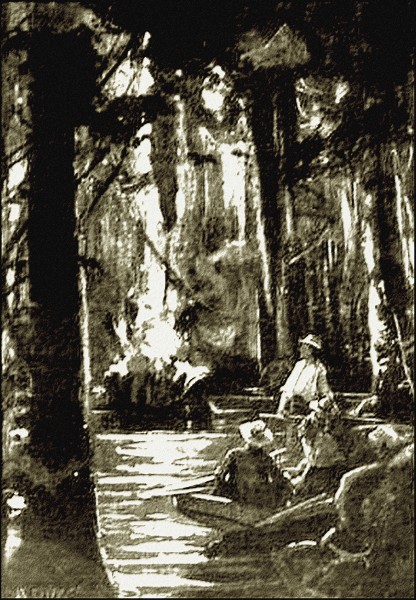
The flames rushed up it with a loud roar.
We baled the boat out and tried to sleep, but an eighteen foot boat is narrow quarters for four men, and to add to our miseries every mosquito and most of the sand flies in South Florida had gathered to the feast, and we had no nets to protect us. We smoked till we could smoke no more; then, cowering under the sail, slept a painful, half-suffocated sleep till the first grey light of dawn, when we ate a few biscuits and started again. We passed one spot where it would have been possible to land and cook breakfast, but would not stop, so sure were we of reaching Clay Springs in time for midday dinner.
But soon we struck raft after raft of lettuce, some so thick that every yard had to be painfully cut through with a brush-hook, and midday found us still in the Wekiva Channel, with no signs of the Clay Springs Run to be seen anywhere.
We became uneasy; we began to fear that we had passed the mouth of the Run. The trees were so thick and the blind channels so frequent that this was more than possible.
If we had done so the outlook was serious. We had plenty of food of a kind, but it was uncooked. You cannot eat flour, hominy, coffee, and bacon without cooking them. And though there was wood enough in sight to cook for a nation, there was no ground on which to light a fire. The river was high for the time of year, and the water stretched back as far as we could see into the impenetrable swamp on either side.
The farther we went the worse the conditions became. The river was so choked with lettuce that most of our time was spent painfully chopping our way through great floating islands. The odour from the rolling masses was sickening, and the river water, which was all we had to drink, was thick and filthy.
Our surroundings were most depressing. Everywhere we beheld the gloomy cypresses rising out of a morass of mud and water, but no life except the brown water-snakes which writhed among the weeds, and the alligators and turtles that floated idly in the stagnant stream or lay on logs at the edge. No sound reached our ears save now and then the thunderous hammering of a great ivory-billed woodpecker somewhere far away in the forest.
Towards five o'clock it began to rain—a thick, fine drizzle. The sky grew rapidly dark, and we were finally forced to tie up to a log. This time we lit a small fire in our frying pan and managed to toast a few slices of bacon, but we could not boil water to make coffee.
Another night of misery passed slowly by. Bull alligators bellowed at intervals, and twice we were wakened by the long drawn, piercing wail of a panther somewhere in the distance. A more creepy sound I never wish to hear. But we were all tired out, and slept at last even in spite of the mosquitoes.
Morning dawned dull but fine.
There was some talk among us of "trying back," but it was at last decided to keep on. We felt sure that we were now a long way past the Clay Springs Run and hoped to reach the St. John's before night.
Vain hope! After hours of struggling with ever-increasing weeds we ran into a bank of slime which barred farther progress. There was no need to inform one another what had happened. Somehow we had left the main stream, and, for how long none of us knew, had been working down a blind backwater! There was nothing for it but to go back.
It was nearly three before we were certain that we were in the main stream again. The current was so nearly imperceptible that it was most difficult to avoid the innumerable blind channels.
By this time we were all suffering from the effects of the putrid water, and Myers was really ill. Fortunately I happened to have a bottle of Jamaica ginger with me, which proved invaluable.
A third night approached and we had not the faintest idea where we were. Just before dark we ran into a tremendous bed of lettuce. Halfway through it the boat's bow struck something solid. It was a cypress log, lying just below the weed. The boat had to be lifted over it, and the work fell to Marshall and myself. I shall never forget how supremely uncomfortable I felt as I stepped over the side and clung with my bare toes to the rounded, slimy log. We had seen scores of moccasins (poisonous water-vipers) in the weed beds. There was more than a chance of treading on one of these sluggish, but deadly, reptiles.
Or suppose I slipped! There was twelve feet of oily water below the log, and, once under the weed, the strongest swimmer in the world would be helpless.
It took all our strength to lift the boat and slide her over the obstruction, but it was done at last, and just as it grew pitch dark we cleared the lettuce and floated into a wide lagoon in which bull frogs croaked dismally and every now and then a heavy fish rose with a sounding "plop!"
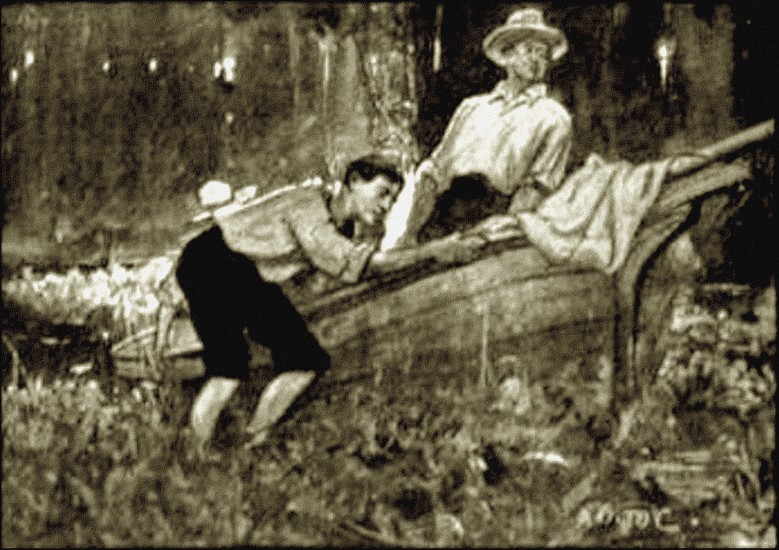
It took all our strength to lift the
boat and slide her over the obstruction.
Here we made another fruitless attempt to light a fire. By this time all the biscuits were gone, and we made a miserable meal of slices of bacon toasted on the embers in the frying pan. We were very thirsty, but only dared to drink a few drops of the brown, filthy water.
The fourth morning found us much the worse for wear. Our faces were swollen out of all recognition by insect bites, and personally I had an ugly feeling of sinking weakness. But there was no use complaining—forward was the word, and we pulled on, taking fifteen-minute spells at the oars. Happily the weeds were not so thick and our hopes rose.
Suddenly the boat emerged from the endless arches of cypress, and their place was taken by a forest of tall cabbage palmettoes. The undergrowth changed, too, it was at thick as ever, but not so lofty. Wild grape-vines matted it, and a flock of birds of the starling tribe rose and winged chattering across the water.
Hurrah! Here was land at last! Mud, certainly, and of the blackest character, but still firm enough to bear our weight. Joyfully we pulled ashore, but the brush was like a quick-set hedge. We had to chop a foothold before we could land. Franks was the first to leave the boat. An odd, whirring noise came from the thicket, and he sprang back hastily. Marshall snatched up a gun, and as the heavy report rolled down the silent riser a five foot diamond rattler writhed in its death agony on the mud.
"I reckon that was close enough!" was all Myers said. We were too hungry and thirsty to mind even a rattlesnake, and in five minutes a fire was crackling. Our kettle was gone, but we boiled water in the frying-pan, and I never tasted anything so good as that first cup of scalding, milkless coffee, strongly flavoured as it was with smoke and bacon grease.
Then we set to work to cook some limpkin which we had shot the previous day. They are birds very like our moorhens and excellent eating. We devoured them half raw, and the next thing was to make bread, which we baked in our ever-useful frying pan.
We ate every bit of the first batch hot, and then cooked some more. After that we made up the fire and, sheltered from mosquitoes by its kindly smoke, lay and slept till past midday.
We were different men when we woke, and ready for anything. We fell sure we could not now be far from the mouth of the river, so decided to push on at once. We had bread and cooked bacon for another twenty four hours, and before that time we should certainly reach St. John's.
But our troubles were not yet over. A mile or two farther on the rivet split again into half a score of channels. Twice we took a wrong one and wasted hours. Night caught us in a worse place than ever, and quite unable to find ground for a fire. The longing for hot coffee drove us to build a raft of logs and try to light a fire on this. It was most tedious work, for we were now again among cypresses, and their branches were high out of reach, so that we had to depend on floating stuff. But we persevered bravely, and at last got a tiny fire to burn. It was hardly started when with a sudden rush and hiss down splashed a heavy shower, wetting us to the skin and putting out the feeble blaze. Thereupon we crawled under the sail and ate dry bread and cold fried bacon.
Next morning Myers had a bad attack of ague—"chills and fever" as we call it in the South. We knew that we had to get him out of the pestilential air of the swamp or the consequences might he serious, especially as we had no quinine. We worked like Trojans and more by luck than good management kept the main channel.
After a time the river grew narrower and deeper, and suddenly I caught sight of a live oak among live cypresses, and gave a howl of delight, for this tree was a sure sign of land. We pulled like furies, frightening scores of alligators, which rolled off the logs on which they had been lying basking and splashed into the dark brown water.
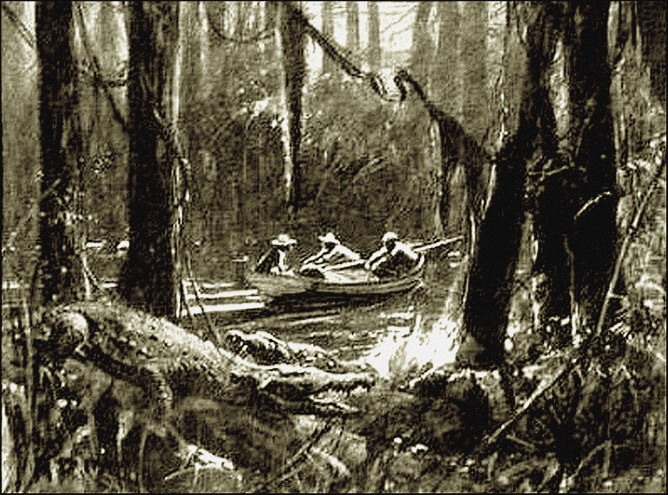
We pulled like furies, frightening scores of alligators.
Ten minutes later we were ashore on a very good imitation of solid ground. We slung up a hammock, put Myers into it, and two of us began the serious business of cooking, while Marshall look a rod and set to work to fish.
Those fish could never have seen a bait before. It was pure slaughter. First a three pound black bass, then a great red throated bream nearly as big as a dinner plate, the choicest pan fish in Florida waters. Then more bass, then a catfish, and next a great black, ugly, slimy mud fish, weighing all of five pounds. In half an hour we had more than we knew what to do with; but Marshall still kept on. Suddenly he gave a yell. "Boys here's the father of all the fish!"
Sure enough it was a monster! The stout bamboo bent double. There was no reel, so Marshall had to trust to the strength of his heavy tackle. But the brute, whatever it was, was too much for him. With a sharp crack the line snapped in the middle. What the fish was we never knew, but there are catfish up to thirty pounds in these waters and bass up to fifteen.
Filleted bream were already sizzling in the pan, and when we sat down to breakfast I verily believe we finished three pounds of fish apiece. Even Myers revived enough to eat a little.
Then, as in gorged contentment we lounged and pulled at our pipes, there suddenly resounded through the silent forest a deep, hoarse hoot.
It was the whistle of the St John's River steamer!
Our troubles were over at last. Next morning, after half an hour's pulling, the cat-boat glided out upon the wide bosom of the St John's. We hoisted our sail, and by nightfall had landed safely at Sanford, the head of the South Florida Railway, where we put our weary selves and our battered boat on the train and were carried rapidly homewards through the pine forests and orange-groves.
Roy Glashan's Library
Non sibi sed omnibus
Go to Home Page
This work is out of copyright in countries with a copyright
period of 70 years or less, after the year of the author's death.
If it is under copyright in your country of residence,
do not download or redistribute this file.
Original content added by RGL (e.g., introductions, notes,
RGL covers) is proprietary and protected by copyright.